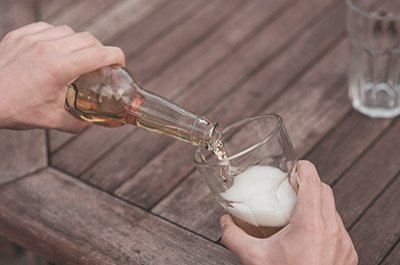Everyone has bad breath at some point in their life. It is a sensitive topic that can lead to embarrassment and stress if not addressed.
A man’s breath affects how others perceive them, so taking care of it is essential. There are several causes of bad breath, but taking these ten steps that dentists recommend, will help eliminate it.
Brush Teeth.

Brushing your teeth after meals keeps your mouth clean and reduce odors from foods such as garlic or coffee.
If you have the habit of not brushing every day, try to brush after lunch or dinner when food odors are strongest.
You can also rinse with a cup of water before brushing to reduce odor-causing particles temporarily.
The best toothbrush is one that has soft bristles and a small head – this allows you to reach all areas of your mouth.
When brushing, use a gentle circular motion and do not press too hard, as this can damage gums and make them bleed.
Remember to brush the outer surfaces, inner surfaces, and chewing surfaces of your teeth.
Brush Tongue.
It is known that the back of your tongue harbors more bacteria than anywhere else in the mouth, so it is important to brush it as well.
It is possible to use the back of your toothbrush to clean your tongue, but some men prefer using special tongue cleaners designed for this purpose, but try not to scrape your tongue with the front of your toothbrush since this can irritate the tissue and cause bleeding.
Finally, be sure to breathe through your nose while you’re brushing your teeth, and make sure you thoroughly rinse out the toothpaste foam after brushing.
This helps keep odors from forming inside your mouth.
Chew Minty Gum.
Chewing gum for at least 20 minutes after meals can help fresh breath because it encourages saliva production and helps neutralize odor-causing particles and acids.
Choose a gum that contains xylitol to kill bacteria and promote salivation. Xylitol is found in most brands of chewing gum and mints.
Another option is to chew parsley after meals, which can be especially effective if you cannot chew gum.
Just chew a couple of parsley leaves after lunch or dinner, and be sure not to swallow the pieces since they do not digest well in the stomach.
Use Mouthwash.
Rinsing with an alcohol-free mouthwash is another good option.

Mouthwash helps reduce bad breath and reduces plaque, tartar, and the bacteria that cause gum disease.
It can be effective for those who suffer from dry mouth due to breathing through their mouths at night.
Do not use mouthwash that contains alcohol since it can dry and cause irritation.
In addition, do not rinse more than once a day using mouthwash since too much can irritate the lining of your mouth and increase your risk of developing a fungal infection.
Mouthwash can help keep your breath fresh all day long if allowed to work its magic overnight.
Be sure to select a mouthwash that does not contain ingredients that can cause dry mouth, like artificial sweeteners.
Avoid Certain Foods.
Foods known for causing bad breath include garlic, onion, cabbage, cauliflower, radishes, turnips, and coffee.
If you consume one of these foods or drinks regularly, try to eat them away from others to avoid offending them with your odor.
Also, use caution around people if you’ve just eaten garlic since it can linger in the air for several hours.
Eating garlic and onions produces the chemical alliin, which is converted into a sulfur compound by your liver. This sulfur compound can cause bad breath if not excreted through your breath or sweat.
Cutting down on the amount of garlic and onion you eat can help reduce the odors from these foods in your mouth.
Cheese and dairy products such as milk and yogurt also produce high levels of sulfuric compounds, so try to limit them as well if they are part of your diet.
Avoid Certain Drinks.
Drinks that are known for causing bad breath include alcohol, coffee, and tea.

These drinks are high in tannins, which can cause dry mouth and leave an odor when exhaled. To be sure, check the ingredients of any toothpaste, mouthwash, or other product you are considering buying to make sure it does not contain alcohol.
Alcohol, sodas, and coffee can also promote bacterial growth in your mouth and cause bad breath. It is not clear exactly why this happens, but it’s thought that bacteria thrive on acids in alcoholic drinks and degrade into a more odor-producing substance.
If you want to avoid this problem, drink water or chew sugarless gum afterward. These products help wash away food particles and stimulate saliva production to keep things flowing smoothly.
Drink Lots of Water.
Drinking a lot of water can help reduce bad breath since it helps flush out the bacteria that cause odor.
In addition, water is an essential part of protein digestion and can help improve how well food breaks down in your stomach, which improves overall digestive health and reduces flatulence.
Drinking water often throughout the day is essential to help keep your mouth healthy and fresh-smelling.
Avoid sugary beverages that encourage bacterial growth in your mouth; instead, drink 2 liters of water a day to keep your breath smelling great.
Avoid Tobacco Products.
Tobacco products such as cigarettes and chewing tobacco can cause bad breath since they contain nicotine.

Additionally, smoking isn’t the only way to get exposed to secondhand smoke, which has been shown to cause bad breath as well.
If you’re around smokers, frequently try using a specialized filter – one that fits over your nose and mouth but allows oxygen through. This helps protect you from breathing their fumes without hindering your ability to talk or breathe properly.
For those exposed to secondhand smoke, gargling with salt water or brushing teeth after exposure can help reduce any lingering odor in your mouth.
Many smokers know that smoking causes bad breath, but most don’t realize that quitting might not eliminate all odors.
This is because the chemicals in cigarettes can damage tooth enamel over time, allowing food particles to stay lodged in your teeth longer than usual and leading to an increase in odor-causing cigarettes.
Some smokers also have habits that make them more likely to develop bad breath, such as drinking through a straw which keeps saliva from properly washing away food particles from the teeth.
If you’re trying to quit, be sure to drink plenty of water and brush your teeth frequently to help remove food particles and keep your breath smelling fine.
Use a Water Flosser or Oral Irrigator.
A water flosser is a device that uses a stream of water to remove food particles and bacteria from between teeth and below the gum line.
It can also help remove any plaque or tartar buildup from your mouth, which is something you should have checked by your dentist at least once a year during routine cleaning.
If you don’t yet own a water flosser, an oral irrigator may be a good alternative since it will do the same thing for your mouth.
Using a water flosser during the day can help you get rid of excess food particles and plaque between your teeth while eliminating any bad smells.
This is because some products come equipped with special nozzles that use ultraviolet lights to reduce bacteria in your mouth, which cause odor.
If you don’t have access to one of these products, be sure to brush along the gumline of your teeth after eating something stinky like garlic or onions since this is where food particles are most likely to get stuck.
Visit Your Dentist Regularly.
Finally, even if you’re following all these tips regularly, it’s essential to go in for regular cleanings at the dentist’s office so they can look over your mouth and ensure everything looks healthy and free of odors or other problems.
If you have gum disease or poor oral health, this can lead to bad breath while also increasing your risk of dental problems in the future.
If you’re a man who suffers from bad breath, your dentist might recommend using a fluoride mouthwash at home to help reduce bacteria and other issues in your mouth, which can also cause a bad odor.
Additionally, they might recommend flossing daily or even using a particular type of toothpaste that includes ingredients to kill odor-causing bacteria.
Last but not least, you should always be sure to schedule regular appointments at your dentist’s office so they can help you maintain healthy teeth and gums, which can reduce bad breath.
This is the only way you can make sure your mouth stays healthy and fresh as often as possible.
Conclusion.
There you have it, ten tips to help you fight the battle against bad breath. Remember, it takes time for some of these strategies to work their magic, so you should commit to using them daily if any problems persist. Your confidence will go up once you win this battle.
What are your tips for getting rid of bad breath? Share them in the comments below.

Joanna Perez is a Certified Cognitive Behavioral Therapy Practitioner, a passionate blogger, writer, traveler, wife, and mother of one boy. Joanna loves to share her thoughts on parenting, health, wellness, and lifestyle.
She is a Certified Women Empowerment Life Coach and has done courses on Life Mastery, Happiness, Health, and Success. She also has studied Neuroscience for Parents and took the Skilled Helper Training Course.
She believes in helping people become the best version of themselves and strives to provide quality informative and inspiring content. She loves animals, especially her two cats, and can often be found taking photos of them as they pose for the camera.